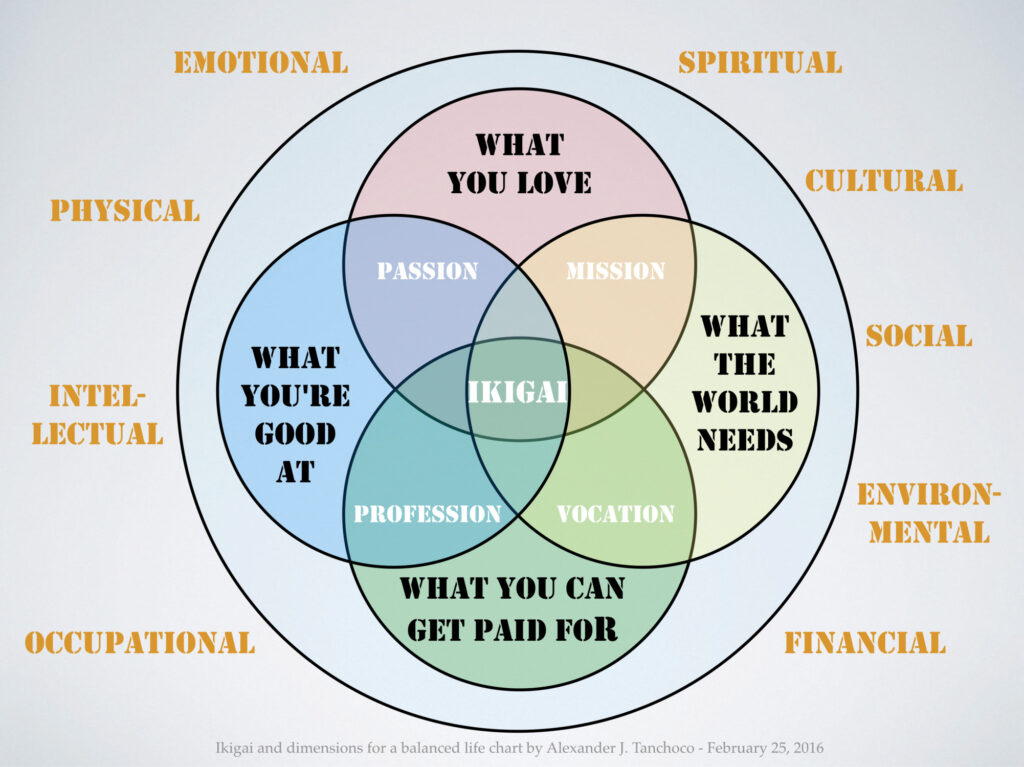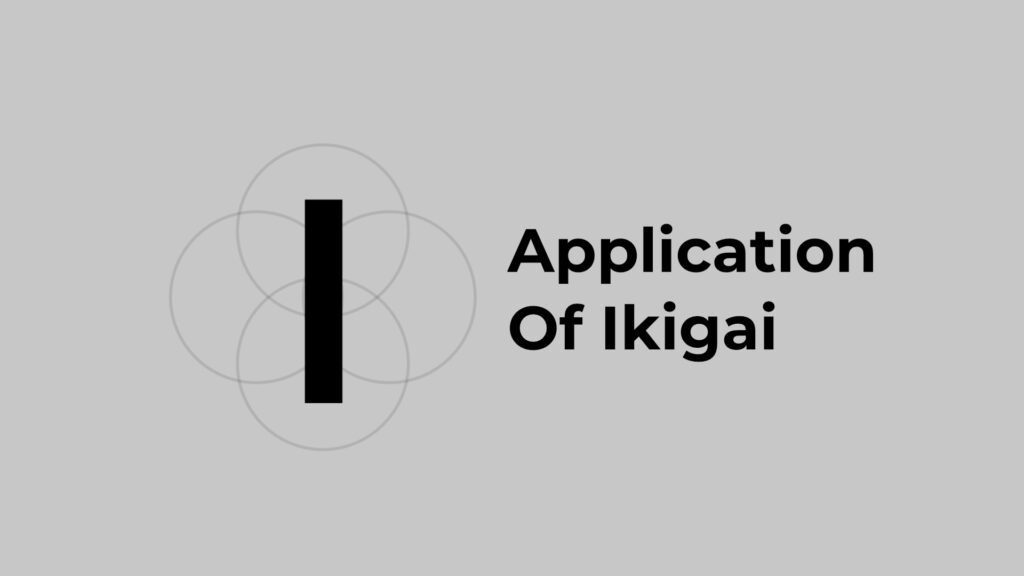Have you heard of ‘ikigai’? It is a Japanese word that became rather famous on the internet some years ago. Simply translated, it’s ‘the worth to live for.’
There is a popular illustration of this philosophy that presents four overlapping circles, at the centre of which ikigai exists.
The first circle is what you love – everything from music to design to cooking. The second circle is what you are good at and continue to enhance. The third circle is what you can be paid for. The fourth circle is what the world needs.
In fact, I have heard of ikigai more outside Japan than I have in Japan. The idea of ikigai became famous because it is very simple, easy to understand and is convincing.
If you have something in your mind, then it is a good exercise to place yourself in the context of these four circles. Think of them as checkpoints. By enhancing the unchecked areas, you can be more fulfilled.

- Perspective 1
But the language of a culture is always alive. So the meaning of ikigai cannot be static. There is no fixed definition.
As a Japanese, I would love to share how I interpret ikigai. My understanding of ikigai can offer you some insight.
When you say ikigai in Japan, there are two kinds of meaning. - Perspective 2
One is similar to a mission that’s worth dying for. Something you are willing to spend or risk your life to achieve. For example, bringing justice or peace to society can be someone’s ikigai. Preventing global warming can be someone’s ikigai.
They see the value in the goal and they are happy spending their life towards that goal. If you have such big visions, you will be fulfilled because your life will make meaningful progress.
A second meaning of ikigai is closer to the joy of life. For example, taking care of grandkids or gardening flowers could be someone’s ikigai. This definition is more attuned to the activities of daily life.
Small things that make you happy. The colours of life that make you smile.
I have found that in life, both those meanings are equally important. What is also important is how to balance both of them.
It is good to have a big, meaningful mission for ikigai. But if you forget your daily life, what are you living for? We have only today to live and embrace.
On the other hand, we can enjoy ourselves everyday. But as members of the human community, we want to enhance it. We need a meaningful purpose. For what are we living? What is the worth of our life? What are we bringing to the next generation as social beings?
The balance of these two different levels of meanings of ikigai are essential.
Excerpt from the book The Alchemist
Let me share a small bit I remember from the book, The Alchemist.
A boy once travelled to meet a wise man. The wise man welcomed him and recommended he take a walk around his beautiful palace. He also handed the boy a spoon with some drops of oil, asking him to take care that it doesn’t spill during his tour.
After the boy returned from his walk, the wise man asked how his experience was. The boy said he hadn’t seen anything because he was busy concentrating on not spilling the oil.
The wise man suggested the boy take another walk around the palace with his oil spoon.
This time, the boy looked around the palace on his tour. When he returned, he told the wise man he had enjoyed his walk and narrated every marvel he saw.
The wise man asked him about the oil. This time, the boy had forgotten about the oil. His spoon was empty. All the oil had spilled out.
I connect this story to the two meanings of ikigai – the big visions of life and daily joys of life.
Story from my life
Here is another example. I travelled to a national park in India with the purpose of seeing the Royal Bengal Tiger. This handsome tiger is, however, very sensitive and rarely shows itself to people.
I stayed for 3-4 days and twice everyday the tour guide took us in a jeep around the national park. I enjoyed the scenery, nature and other animals – birds, monkeys, etc. But I couldn’t spot the tiger. All we saw were paw prints.
This trip gave me a good life lesson.
I was in search of the Bengal tiger on this journey. Did I achieve the purpose? No. Did I enjoy the journey? Yes. In the search for the tiger, I enjoyed the beauty of other animals and nature. I enjoyed the process of searching for the tiger.
Life is the same. A vision is important but what matters is every small step towards the goal. Balance is important.
Ikigai in coaching
In the coaching process, it is essential to set up a goal for the client and deep dive into why it is meaningful for them. One has to understand what kind of core value the client has in order for them to be able to achieve a certain goal. Here, the first meaning of ikigai is applied.
At the same time, the coaching process focuses on step-by-step actions, both small and big, and the learning they give. We appreciate small changes and small understandings. The second meaning of ikigai is applied here.
As a leader of an organisation, it is indispensable for you to set a goal for the team. And like the meanings of ikigai, it’s also important to embrace the progress of the team today. Understand their situation, appreciate their hard work, ensure good dialogue, spread smiles and love.
A balance of meanings is what makes ikigai.

